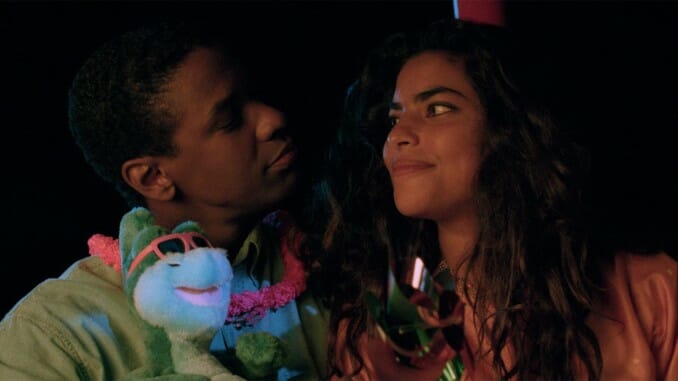Mississippi Masala Imagined Denzel Washington: Sexy Romantic Lead

I like to think of Mississippi Masala as a film from another time—not just from another decade or another era in film history, but from an alternate dimension. A dimension where Denzel Washington isn’t just a Great Black Movie Star, constantly pulling off Oscar-caliber performances when he also isn’t whooping asses in studio actioners. He’s also a charming romantic lead.
Released 30 years ago, the second fiction film from Indian-American filmmaker Mira Nair (Salaam Bombay!) is a little-seen romantic dramedy that, even though Janus Films digitally restored it not too long ago—presumably leading the way for an upcoming Criterion Collection release—currently can’t be found on any streaming or video-or-demand service. (Thank God it’s still on YouTube for free.) Washington stars as Demetrius, a Mississippi carpet cleaner who falls for young beauty Mina (Sarita Choudhury, in her film debut). Along with working at a motel owned and operated by other Indians, she also lives there with her parents (Roshan Seth, Sharmila Tagore). They’ve made the Magnolia State their home after getting kicked out of their native Uganda—generations of Indians were born there after they were recruited to work on the Uganda Railway in 1895—ever since Idi Amin forced Asians out of the country in 1972. Her mother works at a liquor store, regularly serenaded by a beer-swilling, harmonica-playing bluesman, while her still-homesick father continually writes to the courts in Kampala, demanding a trial to get his confiscated property back.
Their courtship is a cute one. It begins when Mina accidentally hits the back of Demetrius’s truck after grocery shopping. Then, it leads to late-night phone calls, walks along the bayou and even a barbecue with Demetrius’ family. But once Demetrius whisks Mina away on an overnight getaway to Biloxi (aka the Playground of the South!) and word gets out, their interracial romance immediately becomes the talk of the town. This doesn’t sit well with Mina’s pop, who’s still kinda sore about getting kicked out of his homeland by dark-skinned people he once considered his brothers and sisters.
Nair and writer/longtime collaborator Sooni Taraporevala create a more playful, less intense Jungle Fever with Masala. (The movie actually has more in common with Wan Pipel, a 1976 Surinamese-Dutch film about the romance between an Afro-Surinamese man and an Indo-Surinamese Hindu nurse.) And much like how Fever spotlighted star Wesley Snipes’ sexual magnetism (as one Def Comedy Jam comic put it, love scenes featuring the man looked too real), Washington’s cool, studly suaveness is on full display in Masala. I’ve seen this movie a few times and it’s still kinda jarring seeing Washington, who has spent most of his career playing characters who are usually too concerned with making a change or a difference or whatever to engage in sexual contact with anyone, actually get busy with someone on camera. Considering how sex scenes are practically verboten in movies these days, I gotta say it’s downright liberating (and sensual as hell) watching Washington and Choudhury wrap their brown limbs around each other in a delicious bedroom sequence.
-

-

-

-

-

-

-

-

-

-

-

-

-

-

-

-

-

-

-

-

-

-

-

-

-

-

-

-

-

-

-

-

-

-

-

-

-

-

-

-








































